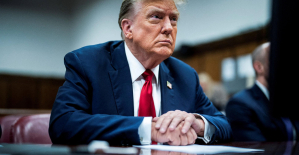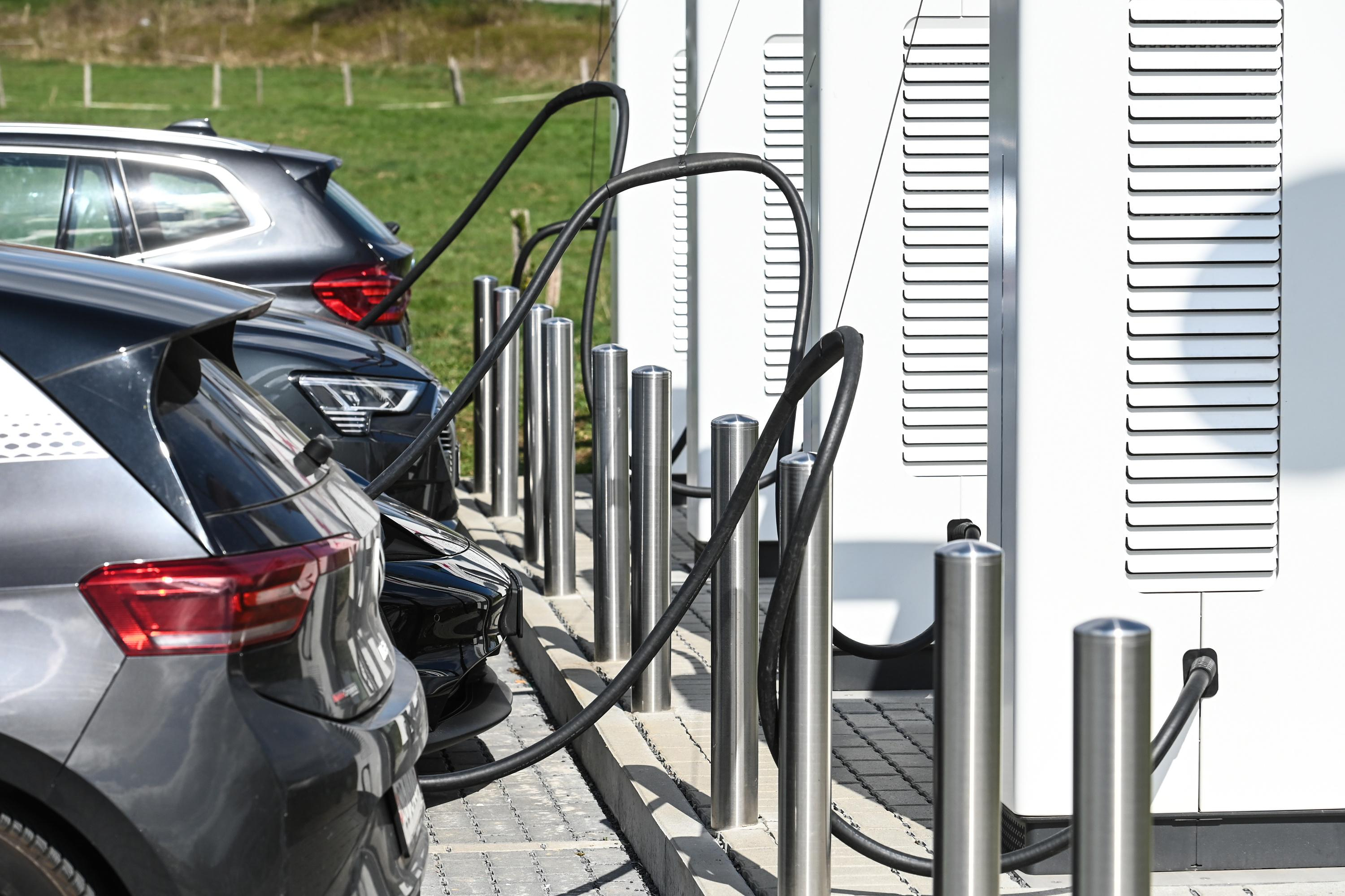It is only a few hundred meters that Federal Finance Minister Christian Lindner (FDP) would have to walk down Pennsylvania Avenue in Washington to get from the main building of the International Monetary Fund (IMF) to the White House. So he could easily get there what he was briefly denied during his visit to the USA in spring because of his corona infection: the obligatory pictures on Lafayette Square with the White House radiating so much power in the background. Olaf Scholz (SPD) was already there in front of the cameras, as was Robert Habeck (Greens).
But Lindner did without it, at least for the first two days of his stay in Washington. This is certainly due to the tight schedule between all the panels and bilateral talks that he held with his fellow finance ministers from other countries, not only at the IMF events but also in the context of the G7 and G20.
But beautiful pictures in front of a lush green lawn and lush red flower borders in the garden of the White House don't quite fit the messages that Lindner had to send home from Washington - and also wanted to.
From his point of view, Germany cannot be satisfied with how it will develop economically in the coming year. "Compared to other industrialized nations, Germany obviously has a lot of homework to take from Washington to Germany," he said, referring to the IMF's growth forecasts for 2023 presented this week.
The experts expect that the economy in Germany will shrink more in the coming year than in all other major economies. Specifically, the IMF is now assuming a minus of 0.3 percent, which is 1.1 percentage points less than the estimate from July.
Lindner's analysis: Germany has been resting on its supposed strengths as an export nation for too long. "We believed that our global competitiveness needed only to be managed, not strengthened through political efforts," he said. This is exactly why the traffic light government will expand renewable energies and speed up approval processes. As a result, prices would sooner or later fall and competitiveness would increase.
The coalition partners in Berlin will be happy to hear this approach. The words on the traffic light line matched Lindner's obvious resolution for the days in Washington not to further fuel the dispute within the federal government that had been going on for weeks. When asked about the extension of the nuclear power plants or the troubled waters in which the FDP found itself after the defeat in the state elections in Lower Saxony, he always responded by pointing out that this was not "an issue here in Washington".
But then Lindner laid the foundation for a possible conflict between the SPD, the Greens and the FDP, which could quickly gain importance in the coming months depending on how the economy develops: the high tax rates for the economy in Germany. "It's not breaking news if I tell you that I think a reform of corporate tax law in Germany is necessary," he said. So far, however, there has been no parliamentary majority in the German Bundestag. So far.
Lindner made it clear that he also sees tax cuts in the next few years as part of the homework he is taking with him from Washington. "In the past, the German business model was also supported by the fact that we had cheap energy imports and were therefore able to afford high tax rates," he said. In the medium term, consideration must be given to how tax policy can also make its contribution to increasing competitiveness again given an overall increase in costs.
In the short term, as Lindner also made clear, the fight against general price increases is the focus. "Inflation can erode the economic foundation," said the finance minister. It inhibits corporate investment and makes citizens poorer.
He agreed at a press conference with Bundesbank President Joachim Nagel. "I think it's likely that on average for the year, and that's a number that you're now hearing from the Bundesbank, there will be a seven before the decimal point," said Nagel. So far, the Bundesbank had expected an inflation rate of over six percent for 2023.
"Everything on shares" is the daily stock exchange shot from the WELT business editorial team. Every morning from 7 a.m. with our financial journalists. For stock market experts and beginners. Subscribe to the podcast on Spotify, Apple Podcast, Amazon Music and Deezer. Or directly via RSS feed.

 Germany: the trial of an AfD leader, accused of chanting a Nazi slogan, resumes this Tuesday
Germany: the trial of an AfD leader, accused of chanting a Nazi slogan, resumes this Tuesday New York: at Columbia University, the anti-Semitic drift of pro-Palestinian demonstrations
New York: at Columbia University, the anti-Semitic drift of pro-Palestinian demonstrations What is Akila, the mission in which the Charles de Gaulle is participating under NATO command?
What is Akila, the mission in which the Charles de Gaulle is participating under NATO command? Lawyer, banker, teacher: who are the 12 members of the jury in Donald Trump's trial?
Lawyer, banker, teacher: who are the 12 members of the jury in Donald Trump's trial? What High Blood Pressure Does to Your Body (And Why It Should Be Treated)
What High Blood Pressure Does to Your Body (And Why It Should Be Treated) Vaccination in France has progressed in 2023, rejoices Public Health France
Vaccination in France has progressed in 2023, rejoices Public Health France Food additives suspected of promoting cardiovascular diseases
Food additives suspected of promoting cardiovascular diseases “Even morphine doesn’t work”: Léane, 17, victim of the adverse effects of an antibiotic
“Even morphine doesn’t work”: Léane, 17, victim of the adverse effects of an antibiotic Orthodox bishop stabbed in Sydney: Elon Musk opposes Australian injunction to remove videos on X
Orthodox bishop stabbed in Sydney: Elon Musk opposes Australian injunction to remove videos on X One in three facial sunscreens does not protect enough, warns L'Ufc-Que Choisir
One in three facial sunscreens does not protect enough, warns L'Ufc-Que Choisir What will become of the 81 employees of Systovi, a French manufacturer of solar panels victim of “Chinese dumping”?
What will become of the 81 employees of Systovi, a French manufacturer of solar panels victim of “Chinese dumping”? “I could lose up to 5,000 euros per month”: influencers are alarmed by a possible ban on TikTok in the United States
“I could lose up to 5,000 euros per month”: influencers are alarmed by a possible ban on TikTok in the United States Dance, Audrey Hepburn’s secret dream
Dance, Audrey Hepburn’s secret dream The series adaptation of One Hundred Years of Solitude promises to be faithful to the novel by Gabriel Garcia Marquez
The series adaptation of One Hundred Years of Solitude promises to be faithful to the novel by Gabriel Garcia Marquez Racism in France: comedian Ahmed Sylla apologizes for “having minimized this problem”
Racism in France: comedian Ahmed Sylla apologizes for “having minimized this problem” Mohammad Rasoulof and Michel Hazanavicius in competition at the Cannes Film Festival
Mohammad Rasoulof and Michel Hazanavicius in competition at the Cannes Film Festival Skoda Kodiaq 2024: a 'beast' plug-in hybrid SUV
Skoda Kodiaq 2024: a 'beast' plug-in hybrid SUV Tesla launches a new Model Y with 600 km of autonomy at a "more accessible price"
Tesla launches a new Model Y with 600 km of autonomy at a "more accessible price" The 10 best-selling cars in March 2024 in Spain: sales fall due to Easter
The 10 best-selling cars in March 2024 in Spain: sales fall due to Easter A private jet company buys more than 100 flying cars
A private jet company buys more than 100 flying cars This is how housing prices have changed in Spain in the last decade
This is how housing prices have changed in Spain in the last decade The home mortgage firm drops 10% in January and interest soars to 3.46%
The home mortgage firm drops 10% in January and interest soars to 3.46% The jewel of the Rocío de Nagüeles urbanization: a dream villa in Marbella
The jewel of the Rocío de Nagüeles urbanization: a dream villa in Marbella Rental prices grow by 7.3% in February: where does it go up and where does it go down?
Rental prices grow by 7.3% in February: where does it go up and where does it go down? Europeans: “All those who claim that we don’t need Europe are liars”, criticizes Bayrou
Europeans: “All those who claim that we don’t need Europe are liars”, criticizes Bayrou With the promise of a “real burst of authority”, Gabriel Attal provokes the ire of the opposition
With the promise of a “real burst of authority”, Gabriel Attal provokes the ire of the opposition Europeans: the schedule of debates to follow between now and June 9
Europeans: the schedule of debates to follow between now and June 9 Europeans: “In France, there is a left and there is a right,” assures Bellamy
Europeans: “In France, there is a left and there is a right,” assures Bellamy These French cities that will boycott the World Cup in Qatar
These French cities that will boycott the World Cup in Qatar Serie A: Bologna surprises AS Rome in the race for the C1
Serie A: Bologna surprises AS Rome in the race for the C1 Serie A: Marcus Thuram king of Italy, end of the debate for the position of number 9 with the Blues?
Serie A: Marcus Thuram king of Italy, end of the debate for the position of number 9 with the Blues? Milan AC-Inter Milan: Thuram and Pavard impeccable, Hernandez helpless… The tops and flops of the derby
Milan AC-Inter Milan: Thuram and Pavard impeccable, Hernandez helpless… The tops and flops of the derby Ligue 2: Auxerre leader, Bordeaux in crisis, play-offs... 5 questions about an exciting end of the season
Ligue 2: Auxerre leader, Bordeaux in crisis, play-offs... 5 questions about an exciting end of the season


















